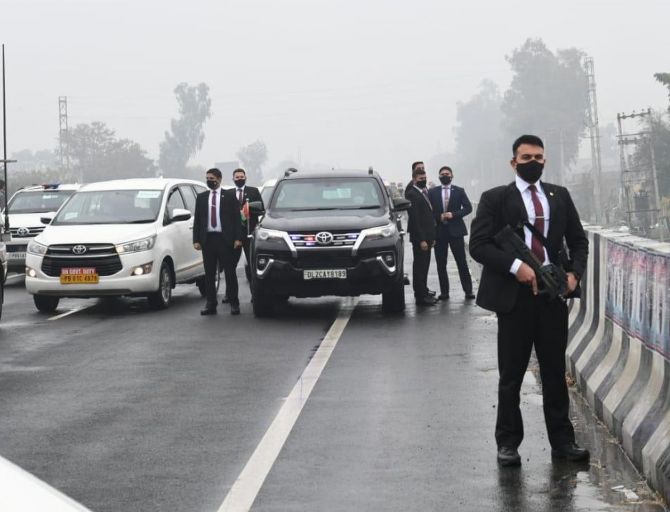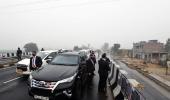Who took the decision for the prime minister, the nation's single most popular leader, to take the road route when they should have already known about the farmers' protests and also the grave risks involved, when and how, asks N Sathiya Moorthy.

With visible attempts to politicise the security lapse during Prime Minister Narendra Modi's recent Punjab visit, ahead of the five-state assembly polls, the probe ordered by the Supreme Court alone has the potential to bring out the truth, the whole truth and nothing but the truth.
This is more so after the Bench headed by Chief Justice of India P V Ramana indicated that the Centre seemed in a haste in the matter, and wanted the independent investigations ordered by the Bharatiya Janata Party-ruled Centre and the Congress government in Punjab, wound up forthwith, as if anticipating contradictory outcomes, complicating VVIP security in the nation than serving any useful purpose.
There was a communication gap, we were told before the Supreme Court's intervention. The focus, fed in and by the media, was near-exclusively on the alleged failure of the state police in the matter.
A political case was being sought to be made out that the alleged state police laxity owed to the political identity of the elected government in Punjab.
On poll-eve, the campaign clashes, especially between the BJP and the Congress, was reaching embarrassingly irresponsible proportions for the nation as a whole.
The Supreme Court's sagacious decision to hand over the probe to a panel headed by a retired judge of the court should thus introduce an element of balance and fairness to the probe, so as to dig out the real hits and misses.
Before the court's intervention, the Centre's probe especially was focussed on the alleged failure(s) of the Punjab police. That may have been a part of it, but was still only a part of it.
It is anybody's guess why no expert commentator in the media had asked the pertinent question: Who took the decision for the prime minister, the nation's single most popular leader, to take the road route when they should have already known about the farmers' protests and also the grave risks involved -- when and how?
The Special Protection Group was created under an Act of Parliament only after the Indira Gandhi assassination in 1984. Obviously, improvements would have been included in the working system over the years, learning from experience on the ground.
In all this, the nodal authority to take such crucial decisions would have been clearly spelt out. Possibly, this scheme itself did not work the way it should have.
As Priyanka Gandhi indicated while joining issues with the BJP, both Indira and Rajiv Gandhi lost their lives as they did not respect the security briefing provided to them.
After noticing that no Sikh security personnel was on her security detail after Operation Bluestar, Indira Gandhi is reported to have insisted on their restoration.
There is nothing to show that officials in charge of the prime minister's security at the time asked her to put it down in writing, or their taking a professional decision independent of the prime minister's politics-tinged directive.
The same goes for Rajiv Gandhi, who was not in office at the time of his poll-eve assassination in Tamil Nadu in 1991. After the 1989 poll reversal, his advisors divined that it all owed also to his inability to mix with the people, a popular Nehru-Gandhi family trait, after the newly-formed NSG insisted on the same when he succeeded slain Indira Gandhi as prime minister.
The prime minister may be the final arbiter of the nation's fate on very many other issues and concerns, including declaring war on an enemy country. But he or she definitely not in charge or control of personal security. That authority and responsibility and the accountability flowing from that should lie elsewhere.
Pending the Supreme Court directive, the assumption was that central agencies tasked with the job would have fed ground-level information to the authorities deciding on the logistics of the prime minister's tours, both inside and outside the country.
Appearing for the Union of India in the Supreme Court, Solicitor General Tushar Mehta spoke about 'intelligence failure', but he did not say where or where all did such failure(s) occur in this case.
In consultation with the state authorities concerned, or foreign governments involved, the top security authorities of the PM would have also been tasked to inform the boss or those others concerned about irritants, if found.
They do not decide the PM's tour and travel plans, yes, but they certainly have the duty and even right to highlight issues and areas of concern to the decision-maker, whoever he or she be.
Before the court intervention, already a section of the media had put out 'exclusive' news stories on the security concerns over PM's poll tours with a long list of terror/militant groups that needed watching.
They too did not say if the authorities had pre-evaluated the possibility of the PM taking a road route to his various campaign venues across north India, if the winter skies played truant. The expectation is that they would have been doubly careful especially after the IAF copter crash that took the life of chief of defence staff, General Bipin Rawat only weeks earlier.
Maybe the nation would not get to know that, and rightly so, but definitely, the court-ordered probe especially should be looking into that aspect while reconstructing the general scenario for a fuller understanding.
A lot will depend on the nature of the court's mandate for the probe team after they had named the presiding officer.
There are other basic questions, too: Who took the decision for the PM to take a 135-km road route when it became clear that a chopper ride was off?
Who all were involved and consulted?
Were any written documents created and maintained on this for a probe team to go into (as the Supreme Court directive for preserving the records may indicate)?
Who then decided on the middle of a flyover wait that the PM should abandon his rally and return to Delhi?
Or, who even decided for the motorcade to remain stranded on the flyover, as a sitting duck, for 20 long minutes?
The assumption in all this is that an alternative road route for the PM might not have been plotted out for contingencies like this, hence security arrangements would not have been made to meet what had been laid down in the 'blue book'.
If so, who thought that sending out a directive for DGP-Punjab at the last minute would have been enough to ensure that policemen from the state secured the road route, when all concerned should have known that there was a farmers' protest and possible blockade against the PM's visit?
The gravity of the situation should have been taken into consideration, given multiple factors, including the fact that the adversarial Pakistan border was not far away.
Other factors, of course, included the farmers' protest and possible violence, especially when claims were being made even when they had gathered outside Delhi for a year, that Khalistani, leftist and other terror groups were behind it all -- and that they were still active on the ground in Punjab.
Flowing from this is the question if anyone in authority cross-checked before the PM actually took the road route to see if the instructions to the DGP Punjab had been followed to the 't'.
It's more so when there would have been advance information about the farmers' protests.
This takes us to the question of advance information about farmers' protests along the PM's routes and rally grounds in Punjab, possibly the whole of this poll season -- and possibly elsewhere too.
The question is not if the protests are justified or not.
The question is not even about the possibility of terror groups operating from behind the protesting farmers all along.
It's only about the need for greater appreciation of threat perceptions for the VVIP, the PM in this case. Did the pre-tour exercises cover all these aspects, when and how?
All of it takes us to the basic question: Was there advance intelligence input about the farmers' protests, its width and depth, during the PM's planned visit, even in the normal course, polls or not?
Threat to the PM and also the person of Narendra Modi from multiple sources, as claimed by a section of the media -- whether or not such documents existed -- should be of added concern.
If so, what was the kind of inputs that the decision-makers about the PM's travel plans and security-preparations receive?
Was their evaluation professional or personalised to suit the immediate demands of the ruling party on the PM's time for campaigning in a poll-bound state, however risky it might otherwise have been?
Clearly, when the decision was taken at Bathinda for the PM to abandon plans to take a chopper ride to the rally venue at Ferozepur and take the road route instead, the relevant intelligence authorities of the Centre on the ground too would and should have been consulted.
If so, was there any re-assessment of the security situation, based on previous threat perceptions, for the PM to risk taking the road-route?
For the truth, the whole truth and nothing but the truth to come out, so that the authorities concerned could make VVIP security fool-proof, all these questions need to be answered.
Without recourse to such a course, seeking to fix responsibility for not posting enough policemen on the new road route of the PM in time, as attempted by the Centre-ordered probe, would have been half-hearted at best, farcical otherwise.
The intent then would be seen as yet another poll-eve gimmick of the ruling party at the Centre, for which they exploited the existing governmental systems and powers given to officials under the SPG Act and other laws.
It is this kind of 'accountability-fixing' exercise that cost the erstwhile ruling DMK in Tamil Nadu elections-1991, which was already underway during the Rajiv Gandhi assassination. Neither of the twin probes that went into the assassination proper and security lapses, or 'events leading up to the assassination', come up with any conclusive evidence in this regard.
No one talked about it later on, other than Sitaram Kesri, then Congress president, using the Jain Commission Report to withdraw support to the fledgling H D Deve Gowda government at the Centre.
Kesri did not even give adequate time for the prime minister of the day to study his demand and respond. He just used the Jain report and the DMK as pawns in the political game that he ultimately lost to the BJP in elections-1998 that followed not long after!
N Sathiya Moorthy, veteran journalist, political analyst, and author, is Distinguished Fellow and Head-Chennai Initiative, Observer Research Foundation.
Feature Presentation: Aslam Hunani/Rediff.com









